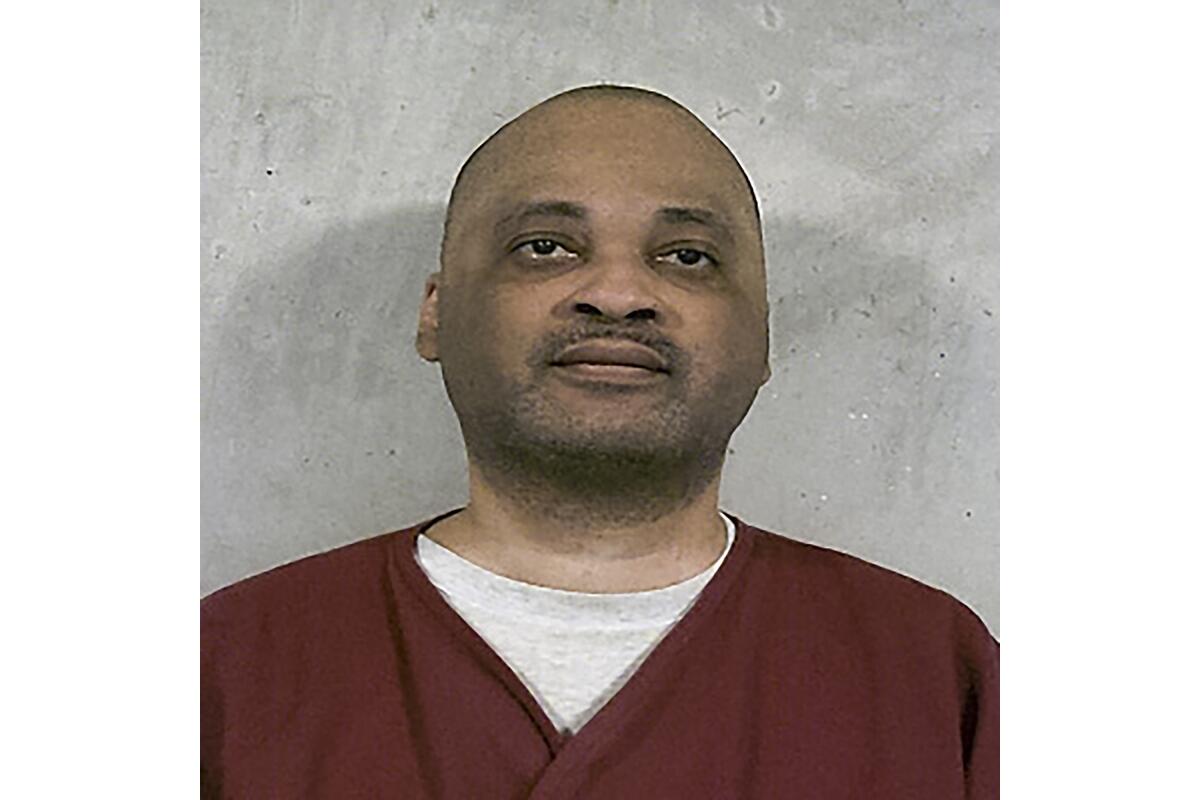Oklahoma executes a man for the 1995 butcher knife slaying of a Tulsa woman

- Share via
McALESTER, Okla. — Oklahoma executed a man Thursday for stabbing a Tulsa woman to death with a butcher knife in 1995 after his escape from a prison work center.
Jemaine Cannon, 51, was pronounced dead 12 minutes after receiving a lethal injection at the Oklahoma State Penitentiary in McAlester. It was the second execution in Oklahoma this year and the ninth since the state resumed lethal injections in 2021.
Cannon was convicted of killing 20-year-old Sharonda Clark, a mother of two with whom Cannon had been living at an apartment in Tulsa after his escape weeks earlier from a prison work center in southwest Oklahoma. Cannon had been serving a 15-year sentence for the violent assault of another woman who suffered permanent injuries after prosecutors say Cannon raped her and beat her viciously with a claw hammer, iron and kitchen toaster.
A federal appeals court late Wednesday denied Cannon’s last-minute appeal seeking a stay of execution in which Cannon claimed, among other things, that he was Native American and not subject to Oklahoma jurisdiction. Asked if he had any last words, Cannon said: “Yes, I confess with my mouth and believe in my heart that God raised Jesus from the dead. Therefore I am saved. Thank you.”
Authorities search for a suspect they say repeatedly punched a 67-year-old woman in the face in East L.A., one of a string of attacks on women in the L.A. area.
Cannon was executed on the same day that Alabama planned to execute James Barber for the 2001 beating death of a woman. It would be Alabama’s first lethal injection after a pause in executions following a string of problems with inserting the IVs.
Clark’s eldest daughter, Yeh-Sehn White, and Clark’s sister, Shaya Duncan, witnessed Cannon’s execution and described it as peaceful.
“In my opinion, he died in a very favorable way,” White said. “Unfortunately my mom did not have that opportunity.”
Cannon claimed at a clemency hearing before the Oklahoma Pardon and Parole Board last month that he killed Clark in self-defense.
“I am deeply disheartened that the act of defending my life and the acts that she initiated against me ever happened,” Cannon told the board via a video feed from the state penitentiary.
Cannon’s attorney, Mark Henricksen, also told the panel that Cannon’s trial and appellate attorneys were ineffective for not presenting evidence to support that claim. His trial attorneys presented no witnesses or exhibits and rested after prosecutors presented their case, Henricksen said.
In a statement sent to the Associated Press this week, Henricksen said the state’s decision to proceed with Cannon’s execution amounted to “historic barbarism.”
“Mr. Cannon has endured abuse and neglect for fifty years by those charged with his care,” Henricksen said. “He sits in his cell a model prisoner. He is nearly deaf, blind, and nearing death by natural causes. The decision to proceed with this particular execution is obscene.”
But White and prosecutors from the attorney general’s office urged the state to execute Cannon, and the board rejected clemency on a 3-2 vote.
Oklahoma uses a three-drug lethal injection protocol beginning with the sedative midazolam, followed by the paralytic vecuronium bromide and finally potassium chloride, which stops the heart. The state had one of the nation’s busiest death chambers until problems in 2014 and 2015 led to a de facto moratorium.
Richard Glossip was just hours from being executed in September 2015 when prison officials realized they received the wrong lethal drug. It was later learned that the same wrong drug had been used to execute an inmate in January 2015.
The drug mix-ups followed a botched execution in April 2014 in which inmate Clayton Lockett struggled on a gurney before dying 43 minutes into his lethal injection — and after the state’s prisons chief ordered executioners to stop.
More to Read
Sign up for Essential California
The most important California stories and recommendations in your inbox every morning.
You may occasionally receive promotional content from the Los Angeles Times.














